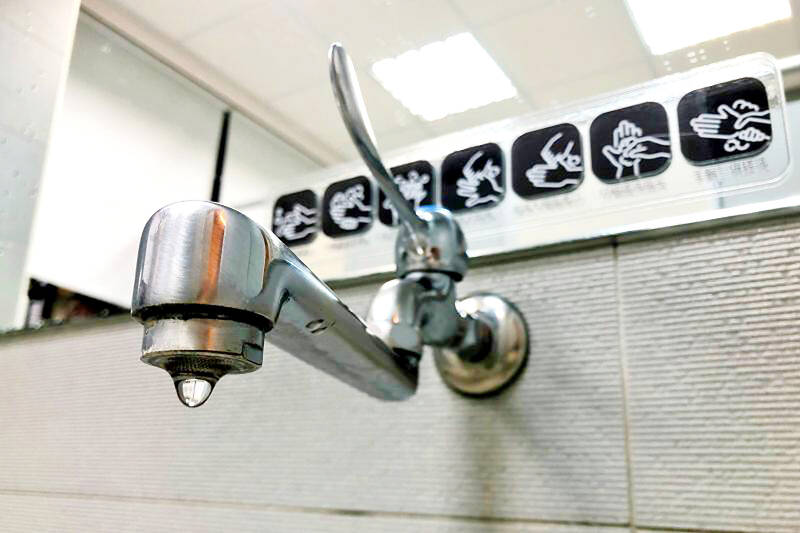Taiwan Water Corp (TWC) chairperson Lee Jia-rong (李嘉榮) yesterday said the state-owned utility is evaluating the potential adjustment of water prices, a measure that if approved would likely target heavy users.
At an event held in Taichung to celebrate TWC’s 50th anniversary, Lee made the remarks when asked if water prices could rise for the first time in 30 years.
The utility is looking to expand its existing four-tier pricing system to a six or seven-tier system, meaning that bills would be progressively higher as water usage increases, he said.

Photo: CNA
As of Aug. 9, last year, the rates imposed by TWC are NT$7.35, NT$9.45, NT$11.55 or NT$12.075 per cubic meter of water, depending on the volume of water used and if the bill is issued monthly.
Users who consume 50m3 of water or less per month, which is about 92 percent of all users, would not see much of a change, Lee said, adding that if anything, the price they are charged could fall.
Most water users pay NT$200 to NT$300 per month, and could see a price cut of about 2 percent with the introduction of an expanded tier system, he said.
However, that would also mean heavier users would see prices rise in line with their consumption level, Lee added.
Given that such an adjustment plan concerns people’s livelihoods and the economic development, different opinions on the issue are expected, Lee said.
Any water rate adjustments would have to be screened and approved by the Water Tariff Review Board under the Ministry of Economic Affairs, he said.
TWC later released a press statement saying that Lee’s comments reflect internal discussion at the company.
However, there are no concrete plans, the company said, adding that TWC would weigh up a range of factors, including commodity prices, the financial situation at TWC and the stability of supply, before proposing a water rate adjustment plan.

An essay competition jointly organized by a local writing society and a publisher affiliated with the Chinese Communist Party (CCP) might have contravened the Act Governing Relations Between the People of the Taiwan Area and the Mainland Area (臺灣地區與大陸地區人民關係條例), the Mainland Affairs Council (MAC) said on Thursday. “In this case, the partner organization is clearly an agency under the CCP’s Fujian Provincial Committee,” MAC Deputy Minister and spokesperson Liang Wen-chieh (梁文傑) said at a news briefing in Taipei. “It also involves bringing Taiwanese students to China with all-expenses-paid arrangements to attend award ceremonies and camps,” Liang said. Those two “characteristics” are typically sufficient

A magnitude 5.9 earthquake that struck about 33km off the coast of Hualien City was the "main shock" in a series of quakes in the area, with aftershocks expected over the next three days, the Central Weather Administration (CWA) said yesterday. Prior to the magnitude 5.9 quake shaking most of Taiwan at 6:53pm yesterday, six other earthquakes stronger than a magnitude of 4, starting with a magnitude 5.5 quake at 6:09pm, occurred in the area. CWA Seismological Center Director Wu Chien-fu (吳健富) confirmed that the quakes were all part of the same series and that the magnitude 5.5 temblor was

The brilliant blue waters, thick foliage and bucolic atmosphere on this seemingly idyllic archipelago deep in the Pacific Ocean belie the key role it now plays in a titanic geopolitical struggle. Palau is again on the front line as China, and the US and its allies prepare their forces in an intensifying contest for control over the Asia-Pacific region. The democratic nation of just 17,000 people hosts US-controlled airstrips and soon-to-be-completed radar installations that the US military describes as “critical” to monitoring vast swathes of water and airspace. It is also a key piece of the second island chain, a string of

The Central Weather Administration has issued a heat alert for southeastern Taiwan, warning of temperatures as high as 36°C today, while alerting some coastal areas of strong winds later in the day. Kaohsiung’s Neimen District (內門) and Pingtung County’s Neipu Township (內埔) are under an orange heat alert, which warns of temperatures as high as 36°C for three consecutive days, the CWA said, citing southwest winds. The heat would also extend to Tainan’s Nansi (楠西) and Yujing (玉井) districts, as well as Pingtung’s Gaoshu (高樹), Yanpu (鹽埔) and Majia (瑪家) townships, it said, forecasting highs of up to 36°C in those areas